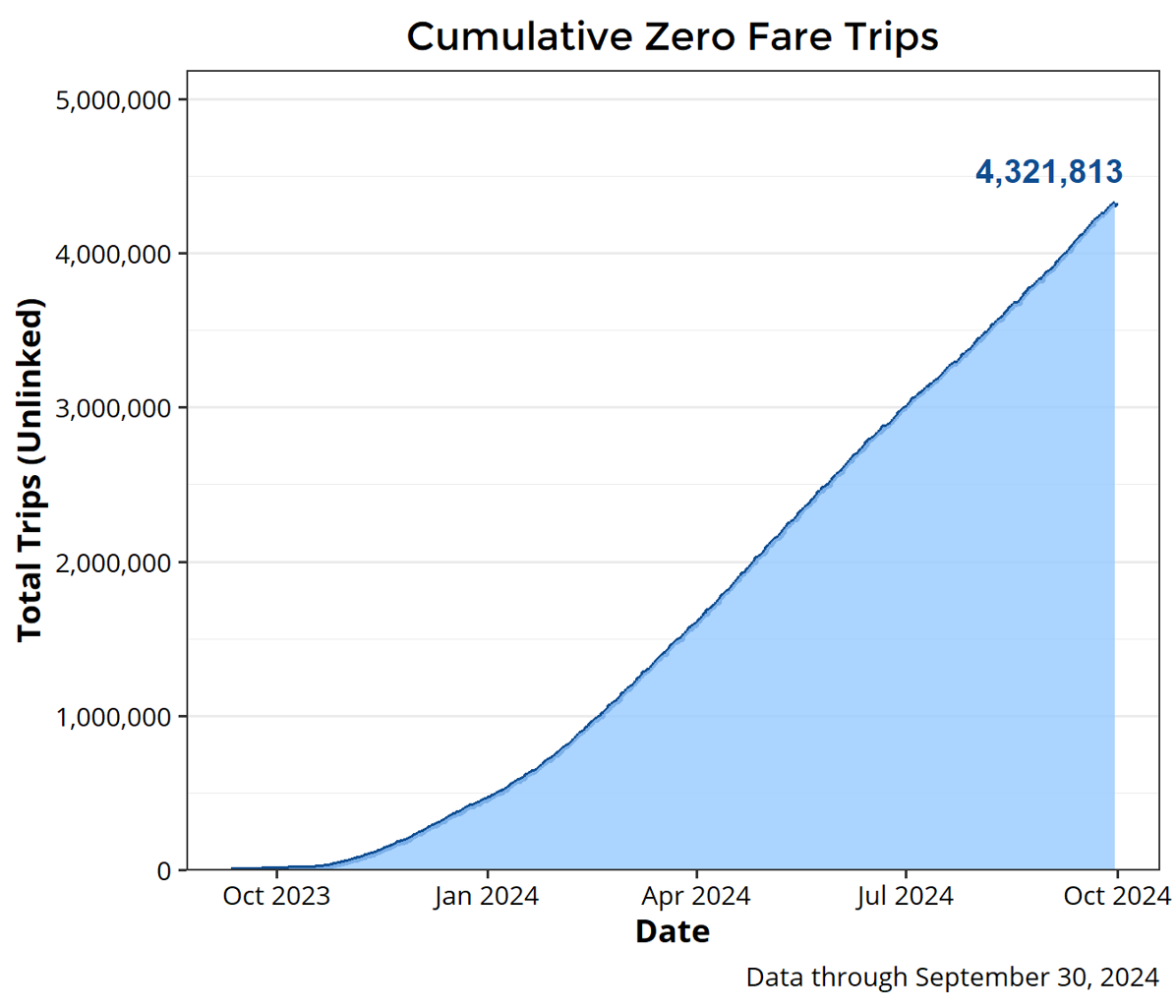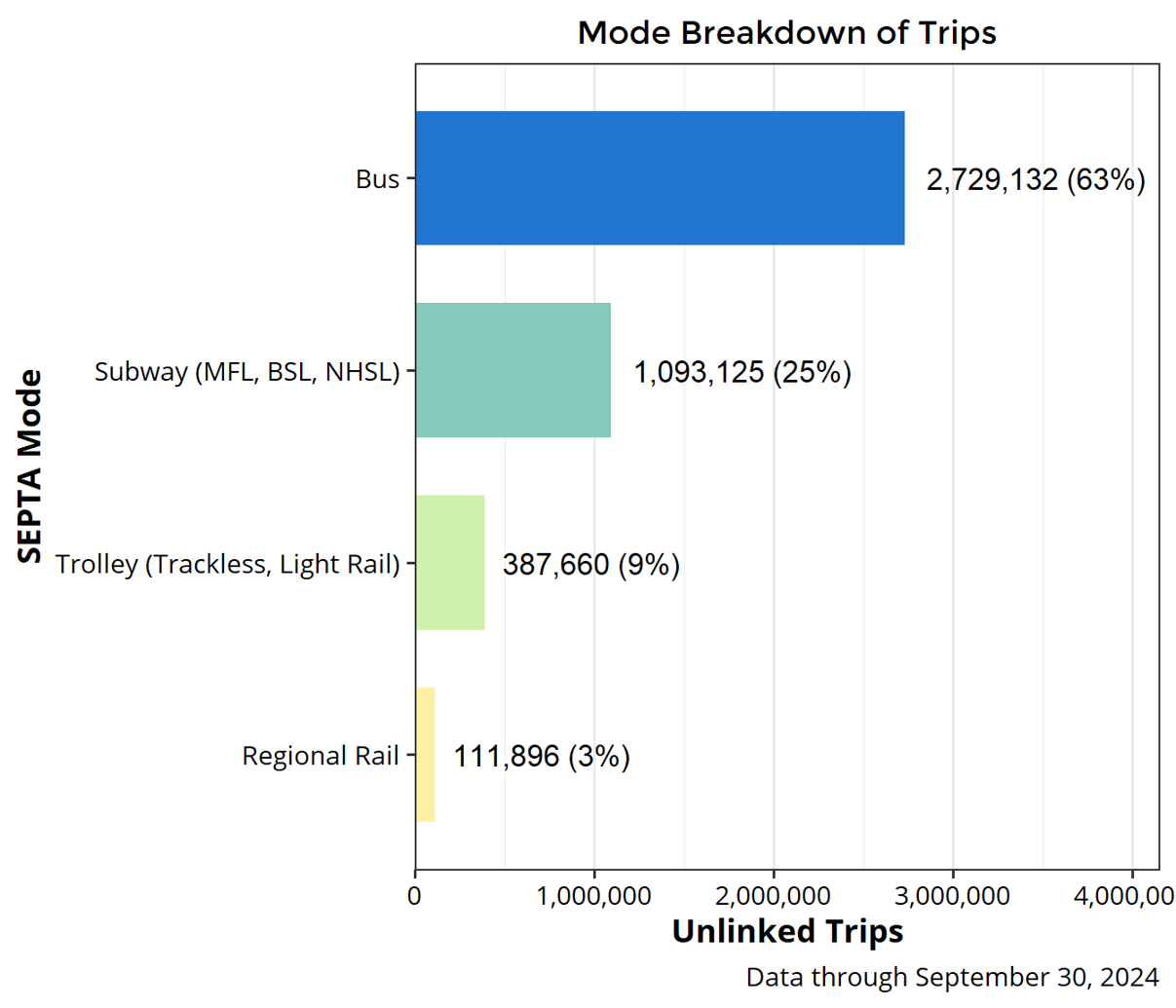PHILADELPHIA – The City of Philadelphia’s Zero Fare program today reports positive impacts after completing its first year and is now moving into its second year. Zero Fare is a two-year pilot program to determine the impact that access to free public transportation has on residents with lower incomes. The City is fully subsidizing fares through direct payment to SEPTA based on usage.
Zero Fare is one of the most expansive and low-barrier transit benefits access programs for transit riders with low incomes in the country based on mode coverage, subsidy level, number of participants, and pathways to enrollment.
In the first year, program transit cards – Zero Fare Key cards – were distributed to over 24,000 Philadelphians living in poverty and cover unlimited taps on all SEPTA lines and services (bus, subway, trolley, Regional Rail, and SEPTA Access) at no cost to the individual.
Residents cannot ask to be part of the pilot or directly sign up for the benefit; Zero Fare identifies a random sample of individuals who are living at the lowest levels of poverty and enrolls participants automatically to eliminate barriers to accessing the benefit.
About 90 percentage of participants were randomly selected using City administrative data, and the remaining 10 percent of participants were enrolled through designated community-based organizations serving Philadelphia’s immigrant and refugee populations. The purpose of these approaches is to reach city residents with the greatest need and who would benefit from it the most. Approximately 64 percent of everyone enrolled are now participating.
“During the first year of the pilot program, we’ve seen improved quality of life for many residents using the benefit,” said Nicola Mammes, Director of Zero Fare. “Participants have shared with us that riding public transportation at no cost to them has provided significant cost savings and has improved access to medical appointments, childcare, and job opportunities. We will be able to provide more specific data about the impact following a formal evaluation thanks to grant funding the City received from the William Penn Foundation.”
According to the 2020 Community Needs Assessment managed through the City’s Office of Community Empowerment and Opportunity, transportation is the highest-ranking barrier to finding and sustaining employment for residents with low incomes in Philadelphia.
“Improving quality of life for all Philadelphia residents is a priority of this Administration, and we are laser-focused on those residents in lower-income households who can prosper with greater access to benefits available to them,” said Cherelle L. Parker, Mayor of Philadelphia. “We are trying to make it easier for people to have access to those benefits. Zero Fare is making it super easy for many people in this pilot program to take transit at no cost, and we know that participants will have new opportunities because of it.”
Zero Fare outreach to all selected program participants is ongoing as the City of Philadelphia continues implementing the pilot through June 30, 2025. Most program participants will be able to use the benefit for at least one year, if not longer, depending on age-eligibility and time of enrollment in the pilot program. As Zero Fare enters its second year, the City plans to distribute an additional 20,000 Zero Fare Key cards to eligible program participants – 19,000 will be mailed directly to residents enrolled automatically based on a lottery, and 1,000 will be distributed through the program’s nonprofit community partners. Program materials have been translated into at least 20 different languages.

The program has recorded over 4.3 million trips on SEPTA in the first year, with activity throughout the entire city and on all transit modes. Zero Fare transit activity continues to increase as the program reaches full distribution and more enrolled participants use the benefit. Nearly 90 percent of Zero Fare transit trips are on the bus (63 percent) and subway (25 percent), with nine percent of trips on SEPTA trolleys and three percent on SEPTA Regional Rail lines. Data on SEPTA Access ADA Paratransit service travel activity is not available.
 An analysis of enrolled participant data shows that more than half (52 percent) of selected program participants are women, and more than half (54 percent) of everyone enrolled identifies as Black, African American, or of African descent. Most enrolled participants are between the ages of 25 and 35 years old (28 percent), with nearly a quarter (24 percent) of participants between the ages of 35 and 45 years old.
An analysis of enrolled participant data shows that more than half (52 percent) of selected program participants are women, and more than half (54 percent) of everyone enrolled identifies as Black, African American, or of African descent. Most enrolled participants are between the ages of 25 and 35 years old (28 percent), with nearly a quarter (24 percent) of participants between the ages of 35 and 45 years old.
“SEPTA is proud to aid the advancement of this program through its partnership with the City of Philadelphia,” said Leslie S. Richards, CEO and General Manager, SEPTA. “This impactful initiative has broken down income barriers, making essential trips easier for thousands of residents. As the Zero Fare pilot enters its second year, we look forward to continued evaluation of its benefits that will support permanent expansion. We also encourage neighboring counties to explore similar equitable public transit access initiatives.”
